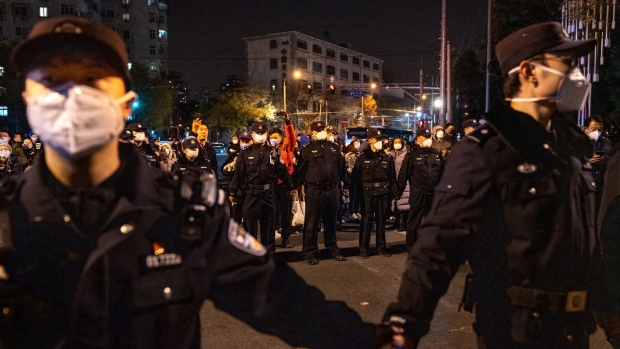Nov 27, 2022
China Markets Slide as Covid Protests Put Investors on Edge
, Bloomberg News

(Bloomberg) -- A sense of chaos and uncertainty swept through Chinese markets on Monday as growing protests against Covid curbs and a record number of infections complicated the nation’s path to reopening.
Investors sold stocks and the yuan, while credit markets saw spreads widen, as citizens in major cities took to the streets in a rare show of defiance. Foreign funds offloaded the most onshore China shares in about three weeks, with focus turning to how the government will respond to the situation.
The initial panic selling appeared to subside in the afternoon, with some bets emerging that the social unrest could actually accelerate an exit from the Covid Zero regime. Still, the turn of events has sown fresh doubt about the market’s outlook after relaxed Covid guidelines fueled an epic rally and a chorus of “buy China” calls earlier this month.
Read: China Covid Unrest Boils Over as Citizens Defy Lockdown Efforts (4)
“I expect markets to remain choppy in the coming months as China repositions itself in managing Covid outbreaks,” said Steven Luk, chief executive officer at FountainCap Research & Investment in Hong Kong. “Reality on the ground is chaotic as officials struggle to implement the 20 new guidelines on Zero Covid while keeping the number of cases from rising.”
The Hang Seng China Enterprises Index closed down 1.7% after slumping as much as 4.5% earlier. The onshore yuan weakened 0.5% against the dollar, having plunged more than 1% at the open, the most since May.
Goldman Sachs Group Inc. economists said they see some chance of a “disorderly” exit from Covid Zero in China, as the central government may soon need to choose between more lockdowns and more Covid outbreaks.
Reopening Stocks
Reopening stocks including airlines and restaurants proved relatively resilient in Monday’s selloff, with Haidilao International Holding Ltd. jumping more than 6%.
The moves underscore a mixed response among traders as some brush aside the social unrest and focus more on the eventual Covid Zero exit.
Read: China Protests Fuel Some Bets for An Earlier Covid-Zero Exit
“The protests create uncertainty but the destination of opening up has been set since the party congress,” said Robert Mumford, an investment manager at GAM Hong Kong Ltd. “One suspects this sort of public pressure might encourage a faster pace of opening which would be a positive but it remains to be seen how the authorities react to recent events.”
Assets have rallied in November as directives for a less-restrictive pandemic approach, coupled with strong support for the property sector, gave investors confidence that the worst is well behind.
A growing number of Wall Street players had turned upbeat on China following Beijing’s policy steps to shore up the economy. On Friday, the People’s Bank of China lowered the reserve requirement ratio for the second time this year.
Read: Asian Markets Brace for Impact as China Unrest Hits Sentiment
Hong Kong’s Hang Seng Index fell 1.6% while a separate gauge of Chinese tech stocks slid nearly 2%, having fallen more than 5% earlier. On the mainland, the CSI 300 Index closed down 1.1%, its biggest decline in a month.
Foreign investors were net sellers of 3.8 billion yuan ($528 million) of onshore shares in Monday’s session via trading links with Hong Kong.
China’s credit markets slid on Monday, as the spreads on investment-grade dollar notes over Treasuries widened as much as 10 basis points, according to credit traders. Dollar bonds of some Chinese property firms including Country Garden Holdings Co. and Longfor Group Holdings Ltd. snapped a three-day rally.
“Assuming the Covid policy would not change much, and we cannot rule out the risk that it gets tougher, the government will likely inject more liquidity to cool down the bond yields,” said Gary Ng, senior economist at Natixis SA in Hong Kong. “However, this will not be enough to calm the market.”
--With assistance from Tania Chen, Georgina Mckay, Lorretta Chen and Wei Zhou.
©2022 Bloomberg L.P.






